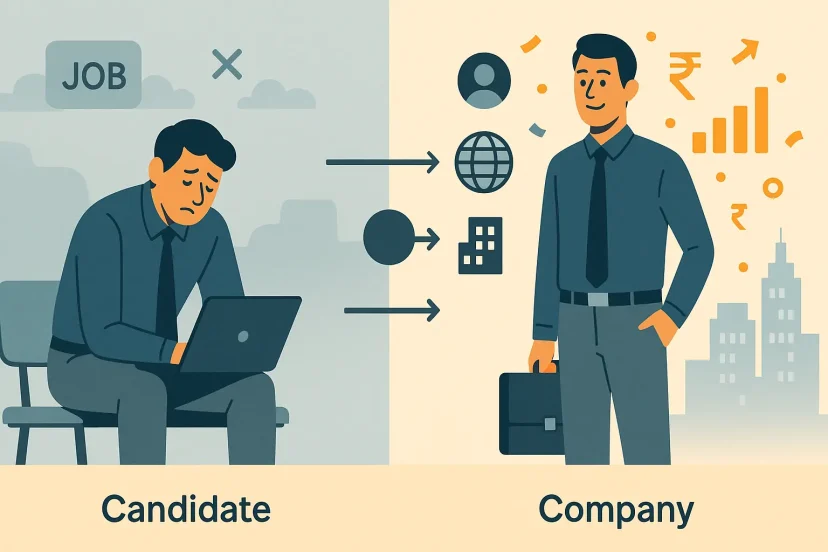Data Engineering Jobs in 2025 are showing a split that highlights just how volatile the market has become. On one side, professionals with 5–6 years of experience are struggling to land opportunities—some even offering to work for free. On the other, peers with similar backgrounds are negotiating salaries as high as ₹80 lakhs per annum.
These extremes reflect how data engineering jobs in 2025 are being shaped by artificial intelligence, shifting company priorities, and global economic uncertainty.
A Tale of Two Engineers
Consider these two conversations:
- Engineer A: A mid-level data engineer laid off in late 2024 has been searching for a role for months without success. “I’m willing to work for free,” he said, “just so I don’t sit idle.”
- Engineer B: Another engineer with comparable experience recently jumped from a salary of ₹45–47 lakhs per year to an offer of ₹80 lakhs.
Neither story is fabricated — both reflect the realities of today’s market. So how can two professionals with similar tenure face such dramatically different outcomes?
The answer lies in three key lenses: the candidate, the market, and the company.

The Candidate Lens: Breadth vs. Depth of Experience
The difference often comes down to experience breadth and adaptability.
- Engineer A spent years maintaining a narrow set of data pipelines. His role involved limited exposure to diverse tools, connectors, or architectures. When asked about broader data engineering challenges, he lacked hands-on examples.
- Engineer B, by contrast, had worked in startup environments, built his own data automation tools, and handled multiple types of data inputs and outputs. He not only solved technical problems but also anticipated user needs.
The lesson? Careers built on repetitive, siloed tasks leave professionals vulnerable in a market being reshaped by AI and automation. Those who seek varied projects, side hustles, or independent tool-building are better positioned for high-value offers.
As one industry mentor puts it:
“Think of your career like a Test match, not a T20. Long-term skill building pays off, even if it feels slow.”
The Market Lens: Oversupply and Shifting Demand
Beyond individual choices, the broader job market plays a decisive role.
- Oversupply of talent: With mass layoffs in 2024, more mid-career engineers are available than companies can absorb. Senior leaders in data science report they haven’t hired freshers in years because they can now access experienced candidates at similar salary levels.
- Decline in voluntary attrition: In big companies, voluntary attrition is now just 4–6%, compared to nearly 30% in 2021–2022. With fewer employees leaving, fewer positions are opening.
- Companies cautious on AI: Businesses are still figuring out how AI will reshape workflows. Many projects remain in “wait-and-watch” mode, reducing immediate hiring needs.
This dynamic creates an especially tough environment for fresh graduates, who face unprecedented competition. Even companies like Infosys — once seen as guaranteed entry points — have reduced fresher hiring, sometimes even rescinding offers.
Hire Data Engineers Ready to Soar
Post your job on WhatJobs and connect with top-tier data talent prepared to thrive in 2025’s evolving tech landscape.
Post a Job Now →The Company Lens: Efficiency Above All
From the perspective of employers, two forces dominate:
- AI-driven efficiency: Firms are actively testing AI to cut costs. If tasks once done by ten people can now be completed by three, businesses will downsize.
- Uncertainty about AI’s trajectory: Leaders are unsure which roles will be most valuable six months from now. Rather than overhire, they are delaying decisions and investing cautiously.
As a result, hiring is tightly focused on roles deemed “crucial and essential.” Growth positions are often deferred.
Lessons for Job Seekers
While the present may feel discouraging, downturns also create windows of opportunity.
- Pursue growth industries: Sectors like AI, electric vehicles, sustainability, and mental health are expanding.
- Build projects outside your job: Independent work shows initiative and exposes you to diverse technologies.
- Play the long game: Prioritize skills that will matter five years from now, not just what might boost your next interview.
Take the Next Step in Your Career
Search WhatJobs for opportunities in AI, EVs, sustainability, and more—find the roles that match your future-ready skills.
Search Jobs Now →The professionals who survive this period will likely emerge stronger when the next wave of hiring inevitably begins.
FAQs: Understanding the Data Engineering Job Market
Q1: Why are some engineers getting huge salary jumps while others remain unemployed?
Breadth of experience is the key differentiator. Engineers with diverse skills and exposure to multiple tools and business contexts are commanding premium offers, while those with narrower experience struggle.
Q2: Why aren’t companies hiring freshers?
With an oversupply of experienced candidates, companies prefer them over fresh graduates. The training cost and time commitment for freshers make them less attractive in a cautious hiring environment.
Q3: How is AI impacting hiring decisions?
AI allows companies to reduce headcount by automating tasks. At the same time, uncertainty about AI’s future capabilities makes employers hesitant to expand teams, leading to slower hiring overall.
Q4: What should candidates focus on in 2025?
Develop projects in growth fields like AI and sustainability, gain exposure to diverse data systems, and adopt a long-term mindset for career growth rather than chasing quick salary hikes.
Bottom Line:
The data engineering job market in 2025 is split between oversupply, cautious hiring, and AI disruption. Candidates who broaden their skills and position themselves in growth industries will stand out — even in tough conditions.




